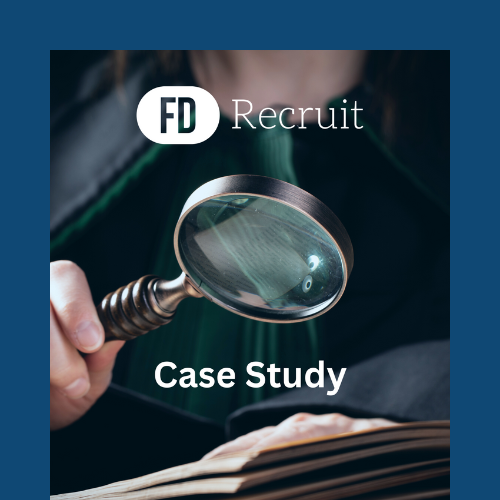Obtaining references for your FD/CFO
One of the most effective ways to ensure a successful hiring decision is by obtaining references from candidates' past professional experiences. Here, we will delve into the significance of obtaining references when hiring a new Finance Director or CFO.
Download our comprehensive list of potential FD/CFO reference questionsObtaining references for your FD/CFO
The process of hiring a new Finance Director or Chief Financial Officer (CFO) is a critical endeavour for any organisation. These individuals play a pivotal role in shaping an organisation’s financial strategies, managing its resources, and driving its growth. One of the most effective ways to ensure a successful hiring decision is by obtaining references from candidates’ past professional experiences. Here, we will delve into the significance of obtaining references when hiring a new Finance Director or CFO and explore the various methods of collecting references, along with their advantages and disadvantages.
The Significance of References
References serve as a window into a candidate’s performance, work ethic, and interpersonal skills. The information provided by referees can corroborate the claims made by candidates on their CV’s and during interviews. For finance leadership roles, where decisions can have far-reaching financial implications, reference checks offer valuable insights that help organisations make informed decisions. There are several ways you can obtain references. We analyse the merits of each method, all have their place and is dependent on your primary motive for obtaining the reference.
- Validating Qualifications: Obtaining references allows employers to verify the qualifications, accomplishments, and skill sets that candidates have listed on their resumes. This validation ensures that candidates possess the necessary expertise to effectively fulfill the responsibilities of a Finance Director or CFO.
- Assessing Cultural Fit: References provide an opportunity to understand how candidates have interacted with colleagues, superiors, and subordinates in previous roles. This insight is crucial in evaluating a candidate’s cultural fit within the organisation and their ability to collaborate across departments.
- Gauging Performance and Leadership: Finance Directors and CFOs are leaders who must exhibit strong decision-making abilities and strategic thinking. References shed light on a candidate’s leadership style, problem-solving skills, and their track record of making well-informed financial decisions.
Collecting References: Methods, Advantages, and Disadvantages
There are several methods organisations can employ to collect references. Each method has its own advantages and disadvantages:
1. Email-Written References
This involves reaching out to referees provided by the candidate via email
Advantages:
- Flexibility: Referees can respond at their convenience, eliminating scheduling conflicts.
- Structured Responses: Employers can provide a specific set of questions, ensuring focused feedback.
- Permanent Record: Written references serve as a tangible record for future review or legal purposes.
Disadvantages:
- Potential Bias: Candidates might provide references that only portray them favourably, minimising objectivity.
- Lack of Real-Time Interaction: Written responses lack real-time interaction and follow-up.
- Limited Insights: The format may limit the depth of information provided, missing out on nuanced feedback.
2. Verbal Phone References:
This involves reaching out to referees provided by the candidate via phone
Advantages:
- Personal Interaction: Phone calls allow for in-depth discussions and the opportunity to ask follow-up questions.
- Real-Time Responses: Immediate responses enable probing into specific aspects and clarifications.
- Human Element: Verbal communication offers intangible insights like tone and enthusiasm.
Disadvantages:
- Scheduling Challenges: Coordinating schedules between employers, referees, and time zones can be cumbersome.
- Time-Consuming: Phone calls can be lengthy, especially when multiple references are involved.
- Limited Record: Verbal references lack a permanent, written record for future reference.
3. Online Reference Check Services:
There are platforms that offer automated reference check services, where employers send a link to referees, who then provide feedback through an online survey.
Advantages: Standardised process, anonymity for referees, and streamlined data collection.
Disadvantages: Lack of personal interaction, potential limited insight due to standardised questions, and less opportunity for follow-up.
Conclusion
In the competitive landscape of finance, making a well-informed hiring decision for the roles of Finance Director or CFO is paramount. Obtaining references offers a comprehensive understanding of a candidate’s abilities, qualifications, and compatibility with the organisation’s culture. While there are various methods to collect references, each comes with its own set of advantages and disadvantages. Striking a balance between personalised insights and efficiency in the reference-checking process is crucial for making the right choice and securing a capable leader who can drive the financial success of the organisation.
In our experience, unless you are collecting a reference just as a written box ticking exercise then we would encourage clients to have in depth verbal discussions with referees. When using this method you will be able to articulate your opportunity and canvass their opinion regarding the candidates suitability towards your required responsibilities.
Download our list of potential FD or CFO reference questions






